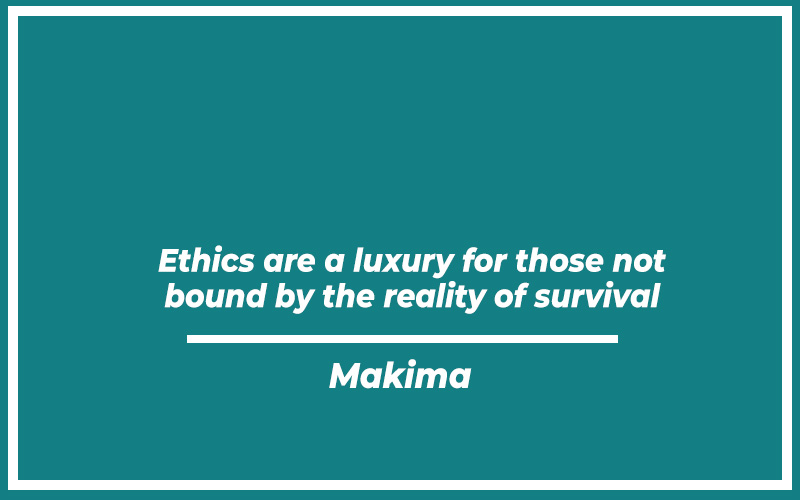If you’re intrigued by characters who blend mystery with a commanding presence, then Makima from “Chainsaw Man” will surely capture your attention. Known for her enigmatic and often chilling demeanor, Makima’s quotes reflect her complex personality and philosophical depth.
Her words are not just dialogues; they are carefully crafted messages that reveal her manipulative and powerful nature.
As you delve into Makima’s quotes, you’ll find yourself pondering the intricacies of control, power, and human desires, all of which she navigates with a disturbing grace.
Best Makima Quotes

“There’s no need for love when you can have fear.” – Makima
Makima’s declaration underlines a core aspect of her leadership style: fear as a tool of control. Unlike love, which is complex and fickle, fear is straightforward and manipulative. In “Chainsaw Man”, Makima operates within a world where power equates survival, making fear a more reliable ally than love.
This approach not only simplifies the mechanics of control but also avoids the vulnerabilities associated with emotional connections. Her preference for fear over love emphasizes her pragmatic, albeit cold, approach to achieving her objectives, stripping relationships of their emotional essence to maintain authority and order.
Also Read: Taco Quotes (with Explanation)
“The necessary evil you speak of is just an excuse to justify the evil things you do.” – Makima
Makima criticizes the concept of ‘necessary evil’, challenging those who use it as a facade to rationalize immoral actions. This quote reflects her insight into human nature and societal norms, where individuals often cloak their misdeeds in moral ambiguity. By questioning the legitimacy of such justifications, Makima exposes the often self-serving nature of these claims.
Her perspective suggests a deep understanding of moral philosophy, asserting that true necessary evils are rare, and most claimed as such are merely excuses for personal gain or convenience, highlighting her cynical view of human ethics.
“What, the old man never taught you? The prey must never trust what a hunter says!” – Makima
Makima uses this metaphor to underline the peril of trusting those in power. She portrays the world as a predatory environment where naivety can be fatal. This advice is a direct commentary on the dynamics of power and manipulation, stressing the importance of skepticism, especially for those in vulnerable positions.
Her comparison of interpersonal interactions to a hunter-prey relationship illustrates her belief that power inevitably corrupts, and trust is a luxury that the vulnerable cannot afford. This quote encapsulates her pragmatic, survivalist approach to life, where vigilance is key to survival.
“When it comes to sex, the better you understand the other person, the better it feels.” – Makima
This quote reflects Makima’s manipulation of intimacy, where understanding serves as a tool for deeper control. She suggests that the true depth of a sexual experience is enhanced by psychological insight, making it more gratifying. This approach to relationships—viewing them through a lens of strategy and control—mirrors her broader manipulative tactics.
It also highlights a critical aspect of her character: the blending of personal insight with manipulation, using emotional intelligence not just for connection, but for dominance, showcasing her complex understanding of human interactions.
“All devils are born with names. The more those names are feared, the more powerful the devil is said to become.” – Makima
Makima explains the metaphysical economy of fear within the universe of “Chainsaw Man”. Her statement that a devil’s power grows with its infamy reflects the broader themes of reputation and perception in the series.
It also serves as a metaphor for her own power strategy, where her notoriety and the fear she inspires increase her control and influence. This quote offers insight into the supernatural laws governing the series’ world, emphasizing the tangible power of fear and reputation in shaping reality and power structures.
“If there’s a devil that’ll be my friend, then I will take it ’cause I never had any.” – Makima
This rare admission of loneliness from Makima reveals her isolation despite her power. It suggests that her life, defined by control and manipulation, lacks genuine connections. Her willingness to find companionship even among devils underscores her desperation for any form of relationship, highlighting the personal sacrifices she has made for power.
This glimpse into her emotional state adds layers to her character, revealing that behind her formidable facade lies a complex individual grappling with the same desires for companionship and understanding as anyone else.
“I wish to use the Chainsaw Man in order to create a better world.” – Makima
Makima’s vision for a “better world” is revealed as both ambitious and utilitarian. Her goal to utilize Chainsaw Man, a being of immense destructive power, underscores her belief in the ends justifying the means.
This quote captures her complex blend of idealism and ruthlessness, as she aims to reshape the world according to her vision. It also reflects her manipulative nature, viewing Chainsaw Man not merely as an ally but as a tool to achieve her larger, possibly noble, yet undoubtedly self-serving aims.
“Fear doesn’t just keep you alive, it keeps others in line.” – Makima
Makima articulates her belief in the utility of fear as a governing tool, not just for personal safety but for controlling others. This quote encapsulates her authoritarian approach to power, where fear is employed not merely as a defensive mechanism but as a proactive strategy for maintaining order and obedience.
Her perspective is pragmatic and chilling, viewing fear as an essential ingredient in the social contract within “Chainsaw Man”, reinforcing her philosophy that power is most effectively consolidated and maintained through intimidation and psychological dominance.
“Without fear, authority is nothing more than a hollow crown.” – Makima
This statement by Makima underscores her view that true authority requires a foundation of fear to be effective and respected. She suggests that without the ability to instill fear, authority figures are ineffectual and lack genuine power.
This perspective reveals her Machiavellian approach to leadership, where fear is not just a tool but an essential element that gives substance and legitimacy to power. Makima’s philosophy highlights a stark realism in her worldview, dismissing any notion of benevolent leadership as naive or superficial.
“The best way to maintain authority is to make sure no one dares to challenge it.” – Makima
Makima’s approach to leadership is explicitly authoritarian, as she believes in preemptively quashing any potential dissent. This quote reflects her strategic thinking, where maintaining power involves creating an environment where opposition is either too intimidated to arise or swiftly neutralized.
Her philosophy prioritizes stability and control over fairness or freedom, advocating for a proactive and often ruthless management of power dynamics. This reveals her preference for an ordered system, tightly controlled under her oversight, where challenges to her authority are not just discouraged but effectively impossible.
“The more they fear you, the easier they are to control.” – Makima
Here, Makima lays bare the mechanics of her manipulative tactics. By emphasizing the role of fear in governance, she explains how inducing fear simplifies the process of controlling others. This statement points to a direct correlation between fear and ease of control, which is central to her method of maintaining power.
It showcases her cynical view of leadership and her reliance on psychological manipulation, underlining her belief that fear is a more reliable lever of control than respect or loyalty.
“In this world, fear is the currency, and I am its richest.” – Makima
Makima declares herself the ultimate wielder of fear, positioning it as the most valuable currency in the world of “Chainsaw Man”. This metaphor highlights her perception of fear as a tool of trade, with which influence and power are brokered and maintained.
By claiming to be the richest in this currency, Makima asserts her dominance and superior capability in manipulating and controlling through fear, underscoring her formidable presence and the effectiveness of her authoritarian methods.
“Humans are so fond of their moral superiority, but in the end, they do what they must to survive.” – Makima
This quote reflects Makima’s philosophical stance on human nature, critiquing the often hypocritical moral posturing of individuals. She observes that despite humans’ tendency to claim moral high ground, survival instincts frequently lead them to compromise these morals.
This observation speaks to her broader view of the world as a brutal, uncompromising place where ideals are often subordinated to pragmatic needs. It reveals her cynical realism and her understanding of the complex interplay between morality and survival.
“Morality is nothing more than the victor’s version of history.” – Makima
Makima’s take on morality is deeply relativistic; she sees it as a construct shaped by those in power to justify their actions and maintain their status. This quote challenges the notion of absolute moral truths, suggesting instead that morality is malleable and often manipulated to serve the interests of the powerful.
Her perspective highlights the role of power in defining ethical standards, suggesting a skeptical view of historical narratives and the supposed moral lessons they impart. This reflects her overarching belief in the primacy of power over principle in shaping society.
“The prey must never trust what a hunter says.” – Makima
Makima warns against the vulnerability of trust in relationships defined by power imbalances. Her use of the metaphor of a hunter and prey stresses the dangers inherent in trusting those who might have ulterior motives. This quote underlines her belief that in a world driven by manipulation and control, caution and skepticism are necessary survival tools.
It reflects her cynical view that interpersonal interactions are often predatory, where the more powerful party seeks to exploit the less powerful, advising vigilance and distrust as prudent defenses.
“Beasts shouldn’t trust anything a hunter says.” – Makima
Echoing a similar sentiment to her previous advice, this quote from Makima further emphasizes her distrustful and survivalist worldview. By characterizing people as “beasts,” she strips down social interactions to their primal core, suggesting that in the struggle for survival, trusting others can be a fatal error.
This bleak outlook portrays a world where everyone is potentially an adversary, and where the naive and trusting are most at risk of exploitation, promoting a philosophy of guarded interaction as essential for survival.
“Ethics are a luxury for those not bound by the reality of survival.” – Makima
Makima critiques the concept of ethics as impractical for those facing existential threats. This quote suggests that moral considerations are secondary to survival, a luxury afforded only to those who are not struggling to exist.
It reflects her pragmatic approach to life’s harsh realities, where ethical compromises are inevitable for survival. This view challenges idealistic moral standards, arguing that in the brutal world of “Chainsaw Man,” practicality often trumps principle.
“The justification of evil is easier when the goal is a utopia.” – Makima
This quote exposes the dangerous rationale often employed by those seeking radical change or utopian outcomes. Makima points out that lofty goals can be used to justify morally questionable actions, suggesting that the end can corrupt the means.
It’s a caution against the allure of idealistic visions that may lead to justifying harmful actions, highlighting her insight into the complexities of moral decision-making where noble aims are used to cloak nefarious deeds.
“Sometimes, to create peace, you must first destroy.” – Makima
Makima’s statement reflects a belief in the necessity of destruction for renewal, a common theme in narratives of power and transformation. This quote suggests that achieving peace might require violent upheaval, embodying the idea that conflict is an essential precursor to stability.
It reveals her willingness to embrace destructive methods as a valid strategy for achieving a greater good, highlighting the moral ambiguities that characterize her methods and objectives.
“Everyone has a purpose, whether they realize it or not. The trick is to make them follow yours.” – Makima
Here, Makima speaks to the manipulation of others’ destinies to align with one’s own goals. She believes in the utilitarian use of individuals, directing them towards purposes they may not consciously choose for themselves.
This quote reflects her strategic manipulation, where she sees people not just as agents with free will but as tools to be employed towards her own ends, emphasizing her dominance and the control she seeks over others.
“Control over your destiny begins with control over others.” – Makima
Makima asserts that true autonomy and control over one’s fate are achieved through the dominance of others. This perspective places power at the center of self-determination, suggesting that independence is contingent upon one’s ability to control external forces, particularly other people.
It encapsulates her philosophy that power and control are not just means to an end but essential components of securing one’s own future and destiny, underscoring her authoritarian and manipulative nature.
“The prey must never trust what a hunter says.” – Makima
Makima warns against the vulnerability of trust in relationships defined by power imbalances. Her use of the metaphor of a hunter and prey stresses the dangers inherent in trusting those who might have ulterior motives.
This quote underlines her belief that in a world driven by manipulation and control, caution and skepticism are necessary survival tools. It reflects her cynical view that interpersonal interactions are often predatory, where the more powerful party seeks to exploit the less powerful, advising vigilance and distrust as prudent defenses.
“Beasts shouldn’t trust anything a hunter says.” – Makima
Echoing a similar sentiment to her previous advice, this quote from Makima further emphasizes her distrustful and survivalist worldview. By characterizing people as “beasts,” she strips down social interactions to their primal core, suggesting that in the struggle for survival, trusting others can be a fatal error.
This bleak outlook portrays a world where everyone is potentially an adversary, and where the naive and trusting are most at risk of exploitation, promoting a philosophy of guarded interaction as essential for survival.

“Ethics are a luxury for those not bound by the reality of survival.” – Makima
Makima critiques the concept of ethics as impractical for those facing existential threats. This quote suggests that moral considerations are secondary to survival, a luxury afforded only to those who are not struggling to exist.
It reflects her pragmatic approach to life’s harsh realities, where ethical compromises are inevitable for survival. This view challenges idealistic moral standards, arguing that in the brutal world of “Chainsaw Man,” practicality often trumps principle.
“The justification of evil is easier when the goal is a utopia.” – Makima
This quote exposes the dangerous rationale often employed by those seeking radical change or utopian outcomes. Makima points out that lofty goals can be used to justify morally questionable actions, suggesting that the end can corrupt the means.
It’s a caution against the allure of idealistic visions that may lead to justifying harmful actions, highlighting her insight into the complexities of moral decision-making where noble aims are used to cloak nefarious deeds.
“Sometimes, to create peace, you must first destroy.” – Makima
Makima’s statement reflects a belief in the necessity of destruction for renewal, a common theme in narratives of power and transformation. This quote suggests that achieving peace might require violent upheaval, embodying the idea that conflict is an essential precursor to stability.
It reveals her willingness to embrace destructive methods as a valid strategy for achieving a greater good, highlighting the moral ambiguities that characterize her methods and objectives.
“Everyone has a purpose, whether they realize it or not. The trick is to make them follow yours.” – Makima
Here, Makima speaks to the manipulation of others’ destinies to align with one’s own goals. She believes in the utilitarian use of individuals, directing them towards purposes they may not consciously choose for themselves.
This quote reflects her strategic manipulation, where she sees people not just as agents with free will but as tools to be employed towards her own ends, emphasizing her dominance and the control she seeks over others.
“Control over your destiny begins with control over others.” – Makima
Makima asserts that true autonomy and control over one’s fate are achieved through the dominance of others. This perspective places power at the center of self-determination, suggesting that independence is contingent upon one’s ability to control external forces, particularly other people.
It encapsulates her philosophy that power and control are not just means to an end but essential components of securing one’s own future and destiny, underscoring her authoritarian and manipulative nature.
Also Read: Aizen Quotes (with Explanation)
Final Thoughts
Makima’s quotes provide more than just insight into her character; they challenge you to think about broader themes like authority, manipulation, and the cost of ambition.
As you reflect on her words, let them stir you to question the dynamics of power in your own life and the world around you.
Remember, Makima’s influence in “Chainsaw Man” serves as a reminder of how compelling and dangerous such figures can be. Let her quotes inspire you to be wary of where you place your trust and to consider the motives behind those who wield power.

